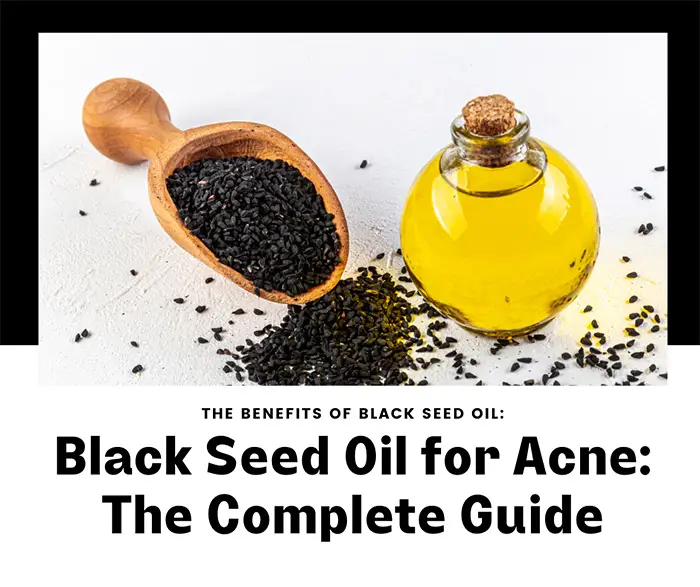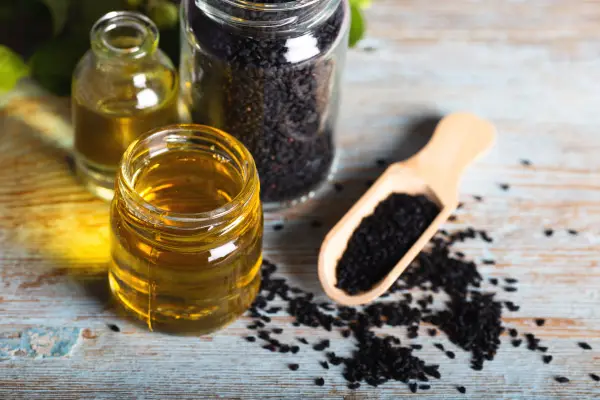
The black seed oil has been considered a miracle oil in the Middle East for centuries. It is currently gaining ground in the mainstream beauty industry as the ingredient for acne-free skin.
While other active ingredients like benzoyl peroxide and retinol are known as popular remedies for acne, these sometimes have side effects like dryness, stinging, itchiness, and burns.
Black seed oil is presented as a natural option that is less invasive yet provides the same result. But is this oil really good for acne-prone skin? In this guide, you will find everything you need to know about this wonder ingredient.
Table of Contents
- What is black seed oil?
- Benefits of black seed oil for acne-prone skin
- Other benefits of black seed oil
- What about drinking black seed oil for acne: Does it help?
- How to use black seed oil for acne
- How to buy good quality black seed oil for acne
- FAQs
What is black seed oil?
Black seed oil is obtained from the cold press of the seeds of the Nigella sativa (fennel flower) plant. This plant grows in parts of the Middle East, Asia, Eastern Europe, and North Africa.
It has been used for over 2000 years in Asian, Aruyvedic, and Arabic cultures for its medicinal properties.
The pure and natural black seed oil has a golden brown colour. It has a shelf life of 2 years and is non-comedogenic. Its scent can be described as mild, earthy, spicy, or woody. It is also referred to as black cumin seed oil, black caraway oil, black onion seed, or kalonji oil.
This lightweight oil has antioxidant, anti-inflammatory, antibacterial, and antifungal properties that make it suitable for combination and acne-prone skin. These are also the reasons why a lot of brands today are turning to this natural oil to formulate products for acne treatment. Below are some of the incredible benefits of black seed oil.

Benefits of black seed oil for acne-prone skin
Black seed oil, derived from Nigella sativa, is gaining recognition for its profound impact on acne-prone skin, thanks to a blend of unique properties:
Antibacterial Action
Central to black seed oil’s efficacy is thymoquinone, an active compound with potent antibacterial qualities. It specifically targets acne vulgaris bacteria, known for causing blackheads and whiteheads. This action helps in effectively reducing the occurrence of these blemishes.
Regulates Sebum Production
Black seed oil’s unique fatty acid profile, which includes linoleic acid (50.2%), oleic acid (19.9%), and stearic acid (2.5%), plays a dual role in managing oily skin. Linoleic acid is particularly effective at unclogging pores and normalizing sebum (oil) production, crucial for preventing acne formation in oily skin types. At the same time, oleic acid ensures the skin remains well-hydrated, striking a balance between removing excess oil and maintaining necessary moisture.
Clinically Proven Effectiveness
A noteworthy 2010 clinical study involving 62 participants with mild to moderate acne showed that a lotion containing 20% black seed oil was more effective than a 5% benzoyl peroxide solution in reducing acne lesions, underscoring its therapeutic potential.
Antioxidant and Anti-inflammatory Properties
Rich in phenolic compounds (thymoquinone, thymol, carvacrol) and saponins (alpha-hederin), black seed oil is a powerhouse of antioxidants. These compounds help mitigate oxidative stress on the skin, which is vital in calming inflammation in acne-prone skin and protecting against free radical damage.
Enhances Absorption of Skincare Products
The high linoleic acid content of black seed oil also aids in enhancing the penetration of other skincare products, making your routine more effective.
Anti-fungal Benefits
Recent studies, including one from 2019, highlight black seed oil’s ability to combat pathogenic yeast and dermatophytes fungi responsible for various skin conditions like fungal acne and ringworm.
This oil equally works to smooth out signs of ageing. Its has high concentrations of linoleic acid helps to boost ceramide production for a healthy lipid barrier.
Acne Scar Healing
Historically renowned for its wound-healing capabilities, black seed oil aids in the reduction of acne scars. By minimizing inflammation and preventing bacterial growth in pores, it accelerates the skin’s healing process.
Nutrient-Rich Composition
Black seed oil is a treasure trove of nutrients beneficial for the skin, including amino acids, omega fatty acids, vitamins (A, D, B1, B2, B3), folic acid, and calcium. These nutrients contribute to overall skin health and resilience against acne.
Other benefits of black seed oil
Soothes Eczema and Psoriasis
Black seed oil’s anti-inflammatory properties help soothe and reduce inflammation in eczema flare-ups and have been shown to be effective in managing psoriasis by enhancing immune function and minimizing skin cell reproduction in affected areas.
Treats Hypopigmentation and Vitiligo
Rich in thymoquinone, black seed oil stimulates melanin production, offering therapeutic benefits for conditions like hypopigmentation and vitiligo, with clinical studies demonstrating its efficacy in diminishing vitiligo patches through regular topical application.
Anti-Aging Properties
The oil is a potent source of antioxidants and essential nutrients that combat signs of aging; it promotes healthy skin cell turnover and elasticity, thereby aiding in the reduction of fine lines and wrinkles, contributing to a more youthful skin appearance.
What about drinking black seed oil for acne: Does it help?
When it comes to acne treatment, all the data available only highlight the topical use of black seed oil. It is, however, proven that the ingestion of black seeds or black seed oil capsules has pharmaceutical benefits. Particularly for medical conditions such as diabetes, hypertension, asthma, arthritis, skin cancer, cardiovascular disorders, diabetes, Alzheimer’s disease, epilepsy, amyotrophic lateral sclerosis, etc.
How to use black seed oil for acne
There are a lot of products on the market that are formulated with this rich oil. From serums to facial oils to acne control and spot treatments, the list is endless, etc.
- It is safe to apply black seed oil directly to the face. It is a lightweight and non-greasy oil with a comedogenic rating of 2. Meaning it won’t clog your pores.
- You can also use it as a facial oil in combination with other natural oils that are great for acne-prone skin, such as rosehip oil, watermelon seed oil, or evening primrose oil.
- Introduce it to your homemade face masks for special acne treatment. Just be mindful of how much you use so as not to waste the products.
Always do a patch test on your forearm 24 hours before to check for allergies. If you are taking medications, make sure to check with your doctor for possible contraindications before use.
How to buy good quality black seed oil for acne
So far, there is no standard procedure to verify the quality of all black seed oil on the beauty market. As such, the quality of products available on the market will vary from one supplier to the next.
How then is it possible to know you are buying quality black seed oil? Well, here are some pointers:
- Make sure the oil you buy is certified organic by the regulatory bodies of the country you purchase. Quality black seed oil should be sourced from trustworthy Certified Organic, vegan and non-GMO. These are always the best on the international market.
- Go for samples gotten through cold press extraction. This method of extraction guarantees less harm to the nutrients present in the oil. Oil sourced through heat-extraction or chemical extraction may be mixed with cheap carrier oils which could be harmful to your body.
- Choose oil stored in an amber bottle rather than a transparent one. It protects the oil from sunlight and heat damage.
- Finally, check for suppliers that sell nitrogen-flushed black seed oil for better preservation.
FAQs
How long does it take for black seed oil to clear acne?
Based on this comparative study between acne treatment with black seed and benzoyl peroxide, it can be said that black seed oil takes anywhere from 6- 8 weeks for noticeable improvements.
Is black seed oil good for fungal acne?
Yes. Black seed oil is effective against fungal acne. Fungal acne occurs as a result of the infection of hair follicles in the skin by yeast. The black seed oil contains phenolic compounds such as thymoquinone and thymol that help eliminate yeast infections.
Does black seed oil work for cystic acne?
There is no data that suggest its efficacy against cystic acne.
Black seeds vs black seed oil vs black seed oil capsules: Which is best for acne?
Black seeds are the seeds of the Nigella sativa plant. They can be ingested for their nutritional benefits.
Black seed oil is the oil obtained from the cold press of black seeds. Black seed oil is proven to have dermatological benefits for the treatment of skin conditions like acne, eczema and psoriasis. Again, there is no scientific proof that ingesting this all contributes to the treatment of acne. But it is recommended for dietary purposes
Black seed oil capsules are capsules that contain black seed oil. This is a form of packing for easy consumption. Black seed oil and oil capsules are more concentrated than seeds. Therefore, better to include it in your diet.
Can black seed oil be taken during pregnancy?
There is not yet enough scientific data to assert that using black seed oil is advised for pregnant women. It is best to consult with your medical doctor before use.

Petra Nakashian (previously Kravos) is a dedicated natural health and beauty blogger, driven by the loss of her parents to cancer, which led her to meticulously research beauty product ingredients. With over 10 years of experience, her in-depth knowledge has made her a trusted expert in the field. Founder of Be Healthy Now and Green Beauty Talk, Petra recently expanded her expertise with Beauty Insights Hub, exploring a wider range of beauty treatments. Committed to transparency and honesty, her work is a vital resource for navigating the complex world of beauty.

